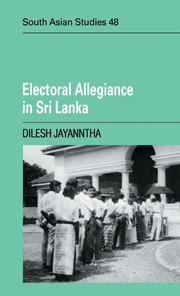Book contents
- Frontmatter
- Contents
- Acknowledgments
- List of abbreviations
- 1 Introduction
- 2 Bluville: the constituency and the patronage network of Doctor Ay (1947–1959)
- 3 Bluville: the patronage network of Korale-Mudaliyar Kit Foo and his son, Dee (1947–1959)
- 4 Bluville: the growth of the State (1956–1982)
- 5 Greenville: the patronage networks of the Mou/Nous and the Pou/Kous (1947–1959)
- 6 Greenville: the growth of the State (1956–1982)
- 7 Red Town: the urban setting (1947–1959)
- 8 Red Town: the growth of the State (1956–1982)
- 9 Communal minorities, political dissidents and the JVP
- 10 Conclusion
- Glossary of Sinhalese Terms
- References
- Index
- CAMBRIDGE SOUTH ASIAN STUDIES
4 - Bluville: the growth of the State (1956–1982)
Published online by Cambridge University Press: 11 September 2009
- Frontmatter
- Contents
- Acknowledgments
- List of abbreviations
- 1 Introduction
- 2 Bluville: the constituency and the patronage network of Doctor Ay (1947–1959)
- 3 Bluville: the patronage network of Korale-Mudaliyar Kit Foo and his son, Dee (1947–1959)
- 4 Bluville: the growth of the State (1956–1982)
- 5 Greenville: the patronage networks of the Mou/Nous and the Pou/Kous (1947–1959)
- 6 Greenville: the growth of the State (1956–1982)
- 7 Red Town: the urban setting (1947–1959)
- 8 Red Town: the growth of the State (1956–1982)
- 9 Communal minorities, political dissidents and the JVP
- 10 Conclusion
- Glossary of Sinhalese Terms
- References
- Index
- CAMBRIDGE SOUTH ASIAN STUDIES
Summary
1956 and after
The 1956 General Election was staggered over three days. After the results of the first day's polling were announced it was clear that Bandaranaike's MEP coalition was heading for a landslide victory, having won twenty-eight seats to the UNP's eight.
Bluville polled on the second day, and many marginal opportunistic groups, anticipating an SLFP victory, turned against the Doctor. The Muslims of Zoville, numbering just over 2,000, were the chief such group. Previously they had voted solidly for the Doctor, but they now believed that their interests as a minority community would be better served by an MP of the governing party – and a close relation of the future Prime Minister at that! Consequently, for the first and last time, they voted en bloc for Dee. Even their women were made to turn up at the polling booth; a phenomenon never witnessed in Bluville before.
There were other marginal opportunistic groups which did likewise. Some teachers at Augusta College, who saw the SLFP's Swabasha policies as offering them greater access to Government jobs and prestige, campaigned clandestinely against the Doctor. And certain local influentials, such as a prominent ayurvedic physician, did likewise. However, they did not control whole blocs of votes in the way that some fish mudalalis, village headmen and small landowners did. The impact of these teachers and ayurvedic physicians was largely on the younger generation of new voters. They mediated between the upper ranks of the SLFP and this group, helping to organize the campaign in a small way.
Meanwhile the group of new voters voted as a bloc, as they were to do in several future elections.
- Type
- Chapter
- Information
- Electoral Allegiance in Sri Lanka , pp. 52 - 81Publisher: Cambridge University PressPrint publication year: 1992



